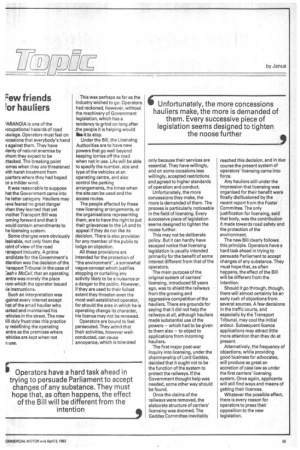Few friends For hauliers
Page 49

If you've noticed an error in this article please click here to report it so we can fix it.
'ARANOIA is one of the ccupational hazards of road iaulage. Operators must feel on )ccasions that everybody's hand s against them. They have slenty of natural enemies by vhom they expect to be decked. The breaking point :omes when they are threatened vith harsh treatment from juarters where they had hoped or a milderwind.
It was reasonable to suppose hat the Government came into he latter category. Hauliers may lave feared no great danger vhen they learned that yet mother Transport Bill was :oming forward and that it vould contain amendments to he licensing system.
Some changes were obviously lesirable, not only from the oint of view of the road ransport industry. A prime :andidate for the Government's Mention was the decision of the "ransport Tribunal in the case of ;ash v McCall, that an operating :entre was merely the place rom which the operator issued is instructions.
Such an interpretation was igainst every interest except hat of the small haulier who marked and maintained his rehicles in the street. The new till duly frustrates this practice If redefining the operating :entre as the premises where ,ehicles are kept when not n use.
This was perhaps as far as the industry wished to go. Operators had reckoned, however, without the machinery of Government legislation, which has a tendency to grind on long after ihe people it is helping would Ilka it to stop.
Under the Bill, the Licensing Authorities are to have new powers that go well beyond keeping lorries off the road when not in use. LAs will be able to specify the number, size and type of the vehicles at an operating centre, and also control the parking arrangements, the times when the site can be used and the access routes.
The people affected by these new licensing arrangements, or the organisations representing them, are to have the right to put their grievances to the LA and to appeal if they do not like its decision. There is also provision for any member of the public to lodge an objection.
All these provisions are intended for the protection of "the environment", a somewhat vague concept which justifies stopping or curtailing any activity likely to be a nuisance or a danger to the public. However, if they are used to their fullest extent they threaten even the most well-established operator, for should the area in which he is operating change its character, his licence may not be renewed.
Operators are bound to feel persecuted. They admit that their activities, however wellconducted, can cause annoyance, which is tolerated only because their services are essential. They have willingly, and on some occasions less willingly, accepted restrictions and agreed to higher standards of operation and conduct.
Unfortunately, the more concessions they make, the more is demanded of them. The process is particularly noticeable in the field of licensing. Every successive piece of legislation seems designed to tighten the noose further.
This may not be deliberate policy. But it can hardly have escaped notice that licensing legislation is usually intended primarily for the benefit of some interest different from that of the operators.
The main purpose of the original system of carriers' licensing, introduced 50 years ago, was to shield the railways from the growing and aggressive competition of the hauliers. There are grounds for saying that it did not help the railways at all, although hauliers made substantial use of the powers — which had to be given to them also — to object to applications from incoming hauliers.
The first major post-war inquiry into licensing, under the chairmanship of Lord Geddes, decided that it ought not to be the function of the system to protect the railways. If the 'Government thought help was .needed, some other way should be found.
Once the claims of the railways were removed, the elaborate structure of carriers' licensing was doomed. The Geddes Committee inevitably reached this decision, and in due course the present system of Operators' licensing came into force.
Any hauliers still under the impression that licensing was organised for their benefit were finally disillusioned by the recent report from the Foster Committee. The only justification for licensing, said that body, was the contribution it made towards road safety and the protection of the environment.
The new Bill clearly follows this principle. Operators have a hard task ahead in trying to persuade Parliament to accept changes of any substance. They must hope that, as often happens, the effect of the Bill will be different from the intention.
Should it go through, though, there will almost certainly be an early rush of objections from several sources. Mew decisions in the traffic courts, and especially by the Transport Tribunal, may cool the initial ardour. Subsequent licence applications may attract little more attention than they do at present.
Alternatively, the frequency of objections, while providing good business for advocates, will produce as great an accretion of case law as under the first carriers' licensing system. Once again, applicants will still find ways and means of getting their licences.
Whatever the possible effect, there is every reason for operators to press their opposition to the new legislation.


















































